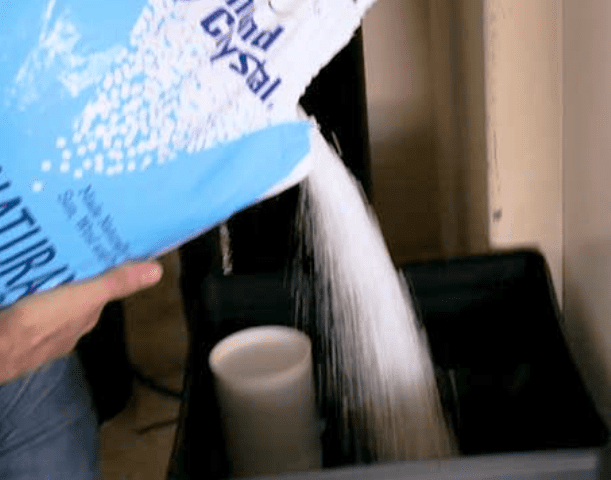
People are always asking where can we buy water softener salt near Winnipeg, and what kinds are available. Although they are all called water softener salt, they are not all created equal. Water softening salts are a type of salt used in water softening systems to remove or reduce water hardness. Hard water contains high levels of minerals, mainly calcium and magnesium ions, which can lead to various problems such as lime scale deposits on pipes and appliances, which can reduce soap scum formation and damage water-using appliances. Water softeners work by replacing these calcium and magnesium ions with sodium ions, effectively softening the water.
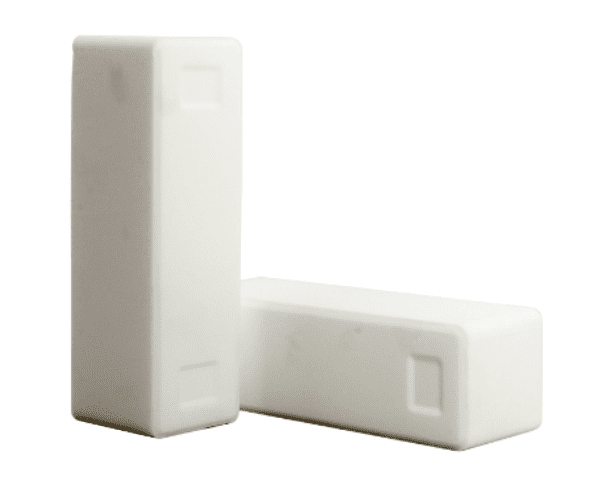
What Types of Water Softener Salt are Available?
Water softener salts are used to regenerate resin beads in water softeners that remove hard minerals such as calcium and magnesium from the water. There are many different types of water softening salts, each with their own benefits and considerations. Salt selection depends on your water softener system, water hardness, budget, and personal preference. The most common types are:
Rock salt (Halite):
This is the cheapest option and is mined from underground salt deposits. It contains impurities and insoluble materials that can build up in the water softener tank over time and cause maintenance problems. (Ideal for use in systems with a detached brine tank only)
Sun-dried salt:
Solar salt is made by evaporating seawater or brine from underground reservoirs in open ponds. It is popular in many water softeners because it is relatively pure and dissolves easily. There are two main subtypes.
Crystal salt:
These are large white crystals of high purity. Often used in large tank water softeners.
Pellet salt:
This is the most common form of sun-dried salt. Compressed into pellets or tablets, it is easy to handle and easy to inject into water softeners. (the easiest to salt to use by far)
Evaporated salt:
One of the purest salts, produced by boiling brine in a vacuum. Impurities and minerals remain. Because of its high purity, it tends to be more expensive. Often recommended for high efficiency water softeners and for those concerned about water quality. (most commonly used by industry needing this quality of salt, normally not used residentially)
Potassium chloride salt:
If you’re worried about adding sodium to your water (which can be a problem with a low-salt diet), you can use potassium chloride salt instead. It works like traditional salt, but replaces sodium with potassium. However, it is expensive compared to other types of salt.
Salt block:
These are large chunks of salt that dissolve slowly. They are used in some commercial and industrial water softening systems, but are not common in residential buildings
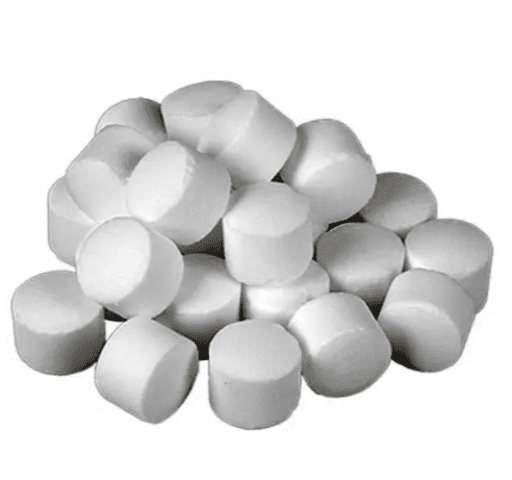
How does a Water Softener System work?
Water softeners use a special type of salt, commonly called “water softener salt” or “salt pellets”, to remove hardness minerals, primarily calcium and magnesium ions, from hard water. Here’s how it works:
Ion Exchange:
The basic principle of water softeners is ion exchange. Inside the water softener tank is a resin bed that consists of thousands of tiny resin beads, usually made of polystyrene material. These resin beads are negatively charged.
Hard water inflow:
When hard water enters a softener, it contains positively charged calcium (Ca2+) and magnesium (Mg2+) ions. These ions contribute to water hardness and can cause problems such as lime scale deposits on pipes and appliances.
Ion exchange process:
As hard water flows through the resin bed, the positively charged calcium and magnesium ions are attracted to the negatively charged resin beads. This attractive force causes calcium and magnesium ions to replace the sodium (Na+) ions originally on the resin beads. Sodium ions are also positively charged, but do not cause problems with water hardness.
Soft water supply:
After passing through the resin bed, the water leaving the water softener is “softened” because the calcium and magnesium ions have been replaced by sodium ions. Soft water is ideal for a variety of household chores, such as washing dishes, laundry, and bathing, as it is less prone to scale build-up and lathers easily.
Regeneration:
Over time, the resin beads become saturated with calcium and magnesium ions, which cannot be effectively exchanged with sodium ions. In this case, the water softener should go through a regeneration cycle. During this cycle, a concentrated salt solution made by dissolving softener salts in water is introduced into the resin tank. A high concentration of sodium ions in the brine solution strips calcium and magnesium ions from the resin beads and washes them out of the system. The resin beads are then recharged with sodium ions from the brine.
Drain and rinse:
After the regeneration process, the remaining brine solution is washed out of the resin tank along with the washed-out hardness minerals and drained.
Ready to use:
Once the regeneration cycle is complete, the water softener is ready to further soften incoming hard water.
Water softeners are effective at removing hardness minerals, but it is important to note that they add a small amount of sodium to the softened water. This elevated sodium level typically does not pose a health concern for most people, but it may be a consideration for those following a low-salt diet. Some water softeners also offer alternatives such as potassium chloride instead of sodium chloride (table salt) as regenerating salt. If you’re concerned about your sodium intake, this may be a better option.
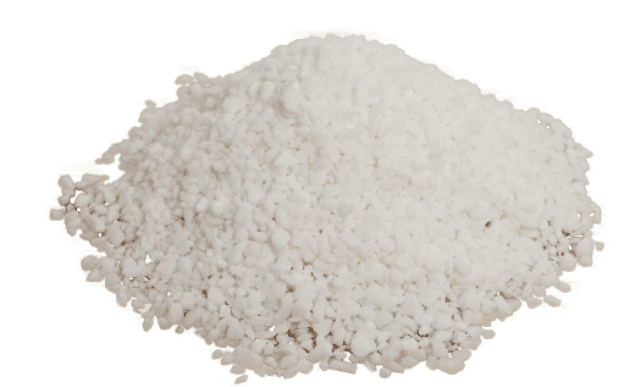
Benefits of Water Softener System with Salt
Using a water softener system with salt has several advantages:
Reduced scaling:
The main purpose of water softeners is to reduce the build-up of scale and mineral deposits in pipes, equipment and fittings. Soft water helps prevent scale build-up that can clog pipes, reduce water flow, and reduce the efficiency of water-using appliances such as water heaters, dishwashers, and washing machines.
Extending device life:
Water softening salts can extend the life and efficiency of water-using equipment by reducing lime scale build-up. Appliances that run on soft water tend to require less repair and last longer.
Energy Efficiency:
Soft water can improve the energy efficiency of water heaters and other appliances. More energy is required to heat hard water due to the insulating effect of limescale deposits. Soft water allows for more efficient heat transfer and saves energy.
Reduce Soap and Detergent Consumption:
Soft water lathers more easily and effectively with soaps and detergents. This means less soap, shampoo, laundry detergent and dishwashing liquid, which translates into cost savings in the long run.
Softens skin and hair:
Soft water is gentle on skin and hair. This leaves skin smoother and hair less dry and brittle, as no mineral deposits remain that can cause irritation and dryness.
Light and soft cleansing:
Clothes washed in soft water tend to be cleaner, lighter and softer. This is because the minerals in hard water attract dirt and detergent residue, making it difficult to rinse thoroughly.
Reduced water spots:
Soft water reduces the formation of limescale on glassware, dishes and faucets. This keeps your glasses and dishes clean and eliminates the need for extra rinsing and drying your hands.
Easy to clean:
Soft water leaves no mineral deposits on the surface, making cleaning more efficient. This saves you time and effort in cleaning your bathroom, kitchen and other areas of your home.
Reduced plumbing maintenance:
Soft water can reduce lime scale build-up in piping systems, reducing maintenance issues and piping repairs over time.
Improves water flavor:
Some people prefer the taste of soft water because it doesn’t have the slight metallic or minerality taste that hard water tends to have.
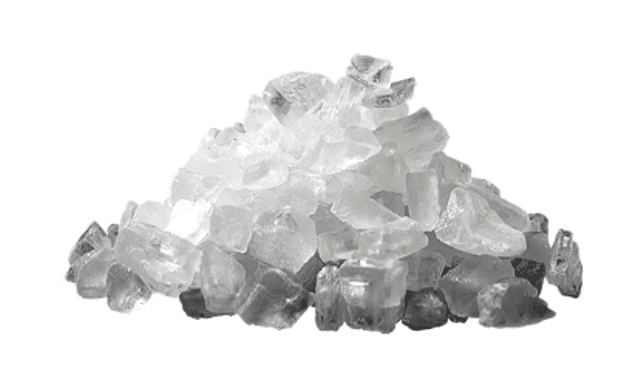
Is Water Softener Salt Harmful?
Water softening salts, usually sodium chloride (table salt) or potassium chloride, are generally considered safe when used as directed in a water softening system. However, like many other substances, it can be harmful if ingested or handled improperly. Here are some considerations:
Ingestion:
Consuming large amounts of water softener salts can be harmful. Sodium chloride in particular can cause health problems such as high blood pressure and cardiovascular disease if consumed in excess. It is important to keep water softening salts out of reach of children and pets to prevent accidental ingestion.
Skin and eye contact:
Contact with skin and eyes may cause irritation. If you come into contact with water softening salts, it is important to rinse the affected area thoroughly with water. Wear gloves and eye protection when handling salt, especially if you have sensitive skin or eyes.
Inhalation:
Inhaling the salt dust from water softeners can irritate the respiratory tract. It is recommended to wear a mask when working with salt to prevent inhalation of dust particles.
Environmental Impact:
Excess salinity released into the environment can damage aquatic ecosystems and contaminate groundwater. Proper use of water softeners and avoiding excessive salt intake are important.
Alternative options:
If you are concerned about the potential health and environmental impacts of using sodium chloride (table salt) in your water softener, consider using potassium chloride, a less harmful alternative. However, potassium chloride tends to be more expensive than sodium chloride.
Conclusion:
Although water softening salts have these benefits, it is important to note that proper use of salt and maintenance of the water softening system are important to ensure its continued effectiveness. Water softening salts themselves are not inherently harmful when properly used in a water softening system. Nevertheless, it is important to take precautions to prevent ingestion, skin and eye contact, and inhalation of salt dust. Also consider the environmental impact and consider alternative options if you have specific health or environmental concerns.
